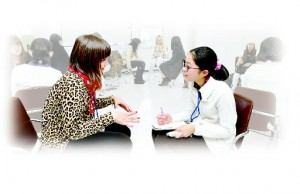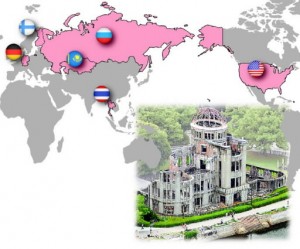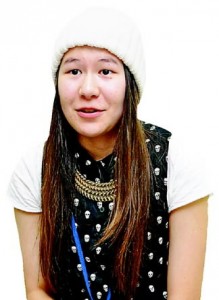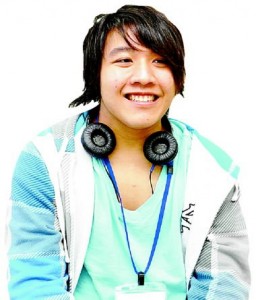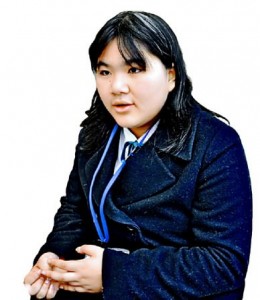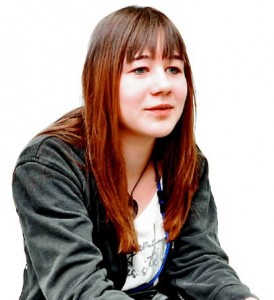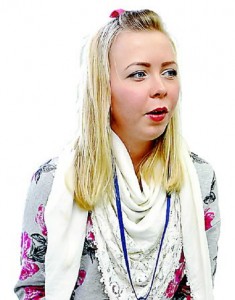Peace Seeds: Teens in Hiroshima Sow Seeds of Peace (Part 2)
Jan. 22, 2015
Part 2: International students in Hiroshima exchange views with Japanese teens
In fiscal 2013, a record 200,000 people from overseas visited Hiroshima Peace Memorial Museum, located in Peace Memorial Park. The number of international visitors to Hiroshima Prefecture during the same period was 843,000, the largest number ever.
It is true that many non-Japanese are seen around the city. But how do young people from abroad, particularly those studying at schools in Hiroshima, view the atomic bombing and the city today? The junior writers of the Chugoku Shimbun and six international students at high schools in Hiroshima spoke in Japanese about Hiroshima and peace.
Before these students came to Japan, most had learned that Hiroshima was attacked with an atomic bomb, but only in history classes. One was surprised at how Hiroshima recovered after the war, and another has visited Peace Memorial Museum six times. We also recognized that we all share the same desire to live in a peaceful world.
In addition to the importance of cross-cultural exchange and understanding, it became clear that we have to work harder on ways to convey the experience of Hiroshima to the world.
What is Peace Seeds?
Peace Seeds are the seeds of smiles which can be spread around the world by thinking about peace and the preciousness of life from various viewpoints. To fill this world with flowering smiles, 44 junior writers, from the sixth grade of elementary school to the last year of high school, choose themes, gather information, and write articles.
International students share impressions of Hiroshima
Shariat Bolatova, 16, Kazakhstan
Happy to see Hiroshima’s abundant nature
I was really happy to see that Hiroshima is blessed with such abundant nature. I think the people of Hiroshima must have worked hard to rebuild the city after the war. The future of the world now lies in our own hands. When I return to my country, I will tell others how many ordinary people fell victim to the atomic bombing and what the city is like today.
In Kazakhstan, hundreds of nuclear tests were performed over a span of 40 years during the time of the former Soviet Union. At a local museum, there is a specimen of a human being with two faces and another with only one eye. These conditions are believed to have been caused by radiation. These facts, along with what happened in Hiroshima, must be conveyed to future generations.
Irina Ekhlakova, 17, Russia
Encouraging people in Russia to visit Hiroshima
Most of the victims of the atomic bombing were ordinary people and children. When I go back to Russia, I want to encourage people to go to Hiroshima and visit Hiroshima Peace Memorial Park and the museum.
Because there is always the chance of an accident, possessing nuclear weapons carries a risk. But if Russia abandons its nuclear weapons, on its own, it might be attacked by another country, and that’s a scary thought. The only way is for all nations to give them up at the same time. It’s important to understand the point of view of others who are living different lives and talk with them about their experiences.
Jonathan Valuriya, 17, the United States
War would have gone on without atomic bombings
The atomic bombing was a sad event, and it’s something I don’t really want to think about. In the United States, we were only taught that the atomic bombings were unfortunate, but if it had not been for the bombings, the war would have gone on.
Nuclear weapons aren’t bad. They provide deterrence. People know the risk of using nuclear weapons, so no one will actually use them. Because they’re kept under tight control, it’s unlikely that terrorists can get their hands on them.
Natthawadee Jangmaw, 16, Thailand
Shocked by A-bomb accounts, should not be forgotten
The city in ruins, the black rain containing radioactive substances... I was shocked to learn about the devastation and to hear the survivors’ accounts.
When I go back to Thailand, I intend to tell my family and my friends what I learned here. We must not forget what happened in Hiroshima so that the mistakes of the past are not repeated. We need to listen to the opinions of other people without holding so tightly to our own.
Maike Vanessa Tschernay, 16, Germany
Hard to eliminate all nuclear weapons
In Germany, 16- and 17-year-olds learn about the Nazis in school. We actually visit the Auschwitz concentration camp and listen to what happened at the time. But it’s true that we aren’t given much information about Hiroshima. Some people mistakenly believe that the level of radiation is still high here. I want to tell people the truth.
But I don’t think we can just say we don’t need nuclear weapons and bring the number right down to zero. We have no choice but to continue saying that nuclear weapons must not be used.
Sini Nisonen, 18, Finland
Atomic bombings and the Holocaust were terrible mistakes
Last summer I took part in a three-day peace camp where we listened to the account of an A-bomb survivor and toured Peace Memorial Museum. The atomic bombings and the Holocaust, caused by the Nazis led by Adolf Hitler, were both terrible mistakes. The important thing is what we’ll do from now on so that mistakes like this won’t be repeated. I’d like my family and friends to come to Hiroshima so I can guide them the museum.
Finland doesn’t have nuclear weapons, but Russia, our neighbor, does. I’m worried, but I can’t do anything about it.
International students share impressions of school life in Japan
The six international students are studying at three high schools in the cities of Hiroshima, Hatsukaichi, and Higashi Hiroshima. They feel that school rules in Japan are more strict compared to those of their home countries. “I was surprised at the restrictions on hairstyles and hair color and the fact that pierced ears are forbidden,” said Sini Nisonen. “We have to be accompanied by a guardian if we want to go to a karaoke place,” said Natthawadee Jangmaw ruefully.
“Teachers talk on and on during the class. I understand why students get sleepy,” said Maike Vanessa Tschernay. “In Japan, students just listen,” said Shariat Bolatova. “But in Kazakhstan, we have tests right after we learn something new.” “The school days are long here. In Russia, school finishes at one or two o’clock in the afternoon, then students do volunteer work or club activities,” said Irina Ekhlakova.
About club activities, Jonathan Valuriya, who belongs to the music club, said, “Club members are more serious here than in American schools.” Natthawadee Jangmaw is active in the kendo club to learn about Japanese culture.
Some students like Japanese entertainers. “Before I came to Japan, I thought Japanese high school girls were eccentric and dressed in a flashy way, like Kyary Pamyu Pamyu, but I found out that they’re just ordinary girls,” said Irina Ekhlakova.
Comments from the junior writers
Shocked by remark “Nuclear weapons are not bad,” but will persist in anti-nuclear efforts
The seven junior writers who exchanged views with the students from overseas shared their impressions of the discussion.
Haruka Shinmoto, first-year high school student
Some said that we won’t be able to abolish nuclear weapons or that world peace will be hard to realize. But we can change the situation, little by little, if each one of us continues to believe that war is wrong and we remember how precious life is.
Ishin Nakahara, first-year high school student
I was disappointed to hear that they have not been taught much about the extent of the damage done to Hiroshima. To help increase the desire for peace among people in other countries, we have to raise awareness about Hiroshima in Japan and around the world. I hope to have the chance to make a presentation on the junior writers’ activities on August 6, when many people come to Hiroshima.
Mei Morimoto, first-year high school student
I want to learn foreign languages so that I can exchange views with people from other countries.
Miku Yamashita, first-year high school student
I hope to convey the facts about Hiroshima through exchanges with people from overseas so they won’t mistakenly believe that Hiroshima still has a high level of radiation.
Marika Tsuboki, third-year junior high school student
I heard May 1 is “Peace Day” in Russia and Kazakhstan. I think it would be good if Japan also had a Peace Day, where students make presentations at schools and other places on what they’ve learned about history and the problems of other countries in the world. That way we can learn about the attitudes of those countries toward war and nuclear weapons, and we can give more serious thought to peace.
Riho Kito, first-year junior high school student
Honestly speaking, I was shocked to hear someone from a nuclear weapon state say that “Nuclear weapons aren’t bad,” or that they don’t know about this issue and aren’t interested. I thought something must have left an impression on them during their time in Hiroshima. If they think there’s a risk in possessing nuclear weapons, they should be more concerned about this and should be thinking that these weapons should be abolished.
Tokitsuna Kawagishi, first-year junior high school student
I learned that we all share the idea that we shouldn’t wage war. I want to respect the views of others as well as my own. I’d like to go abroad someday and tell people that everyone feels the same way, regardless of our nationality.
Junior writers’ postscripts
The American student talked about his personal peace, and the Russian student talked about her family’s peace. What I’d like to convey is that even though there are different ideas about peace, people share the same thought that there should not be war. This feeling we all share is the same as the message which Hiroshima hopes to convey to the world: a world without war. I hope to spread this idea to people around the world. Now that the students from abroad have talked about peace here, it’s our turn to go out into the world as members of a “Hiroshima Peace Mission.” I want to speak directly to people in other countries about what I learned and thought from this meeting with the international students: People might have different ideas about peace in different countries, but people in all countries share the same idea of not wanting war. I would like to be the leader of this mission. (Tokitsuna Kawagishi)
This was my first time conducting a one-on-one interview. As I took notes while making eye contact with the person I was interviewing, my notes became very messy. It was really hard. I’ve never taken photos for the newspaper before, so I’d like to try when I have the chance.
Through our exchanges with the international students, I felt that everyone has a different idea of peace. I interviewed Irina Ekhlakova from Russia, and she told me that “Irina” means “peace” in Latin. We were born and raised in different countries and we speak different languages, but we can still communicate if we have the will. I think these students are really cool to be studying in Japan, far from home.
To communicate the idea of peace, I think it’s important for people to see and reflect on the facts. I know there are many others who have different ways of thinking. I plan to study English hard so I’ll be able to communicate with them. (Riho Kito)
In the group discussion, I was with students from Germany, Finland, and the United States. Each student had a different idea about peace. It was an enriching experience to consider peace from different points of view.
One person said that since many people live in the world, it’s only natural for there to be conflict and that realizing peace in the world is impossible. But we shouldn’t give up. If each one of us believes that war is bad and that life must be respected, then, little by little, the situation can change.
The students said that the A-bomb survivors’ accounts are important and that the history of war should not be forgotten. We need to convey the survivors’ accounts to the world through the Internet and by other means so the atomic bombings will not be forgotten. (Haruka Shinmoto)
I heard that May 1 is “Peace Day” in Russia and Kazakhstan, and students study about other countries and make presentations at school. We don’t have many opportunities to pick one country and study its characteristics, problems, and history. If we had more chances to do that, we would be able to learn about a country’s conflicts, wars, and its attitude toward nuclear weapons. In this way, we would be able to think more seriously about peace. (Marika Tsuboki)
Through our interviews, I learned about current state of peace education in other countries. I heard that they haven’t been taught about the extent of the damage that was caused by the atomic bombing of Hiroshima. To appeal for peace, we should encourage the people of Japan to know more about Hiroshima. To do that, we hope to give a presentation on the activities of the junior writers on August 6, when many people come to Hiroshima. I also hope to learn more about peace in other countries, which I still don’t know enough about. (Ishin Nakahara)
I felt happy when one of the students said, “Before I came to Hiroshima, I thought the city still had scars from the war. But when I arrived, I found that it’s a really beautiful city, so the people of Hiroshima must have worked hard to reconstruct it.” I hope more and more people will visit Hiroshima and think more deeply about peace. To be able to exchange views with other people, I plan to study foreign languages. (Mei Morimoto)
I thought it was disappointing that, in many countries, Hiroshima is only studied in world history classes. When I asked the students how we should make Hiroshima known to people around the world, the students from Kazakhstan, Russia, and Thailand said, “Hiroshima has come a long way since the atomic bombing. The people here have already put in a lot of effort.” I was surprised by their high marks. But some people in other countries mistakenly believe that Hiroshima still has a high level of radiation, so we have more work to do, through exchanges, to help them understand the truth. Each one of the international students had a different idea of peace, which enriched the content of our discussion. This was a valuable experience for me. (Miku Yamashita)
(Originally published on January 22, 2015)

